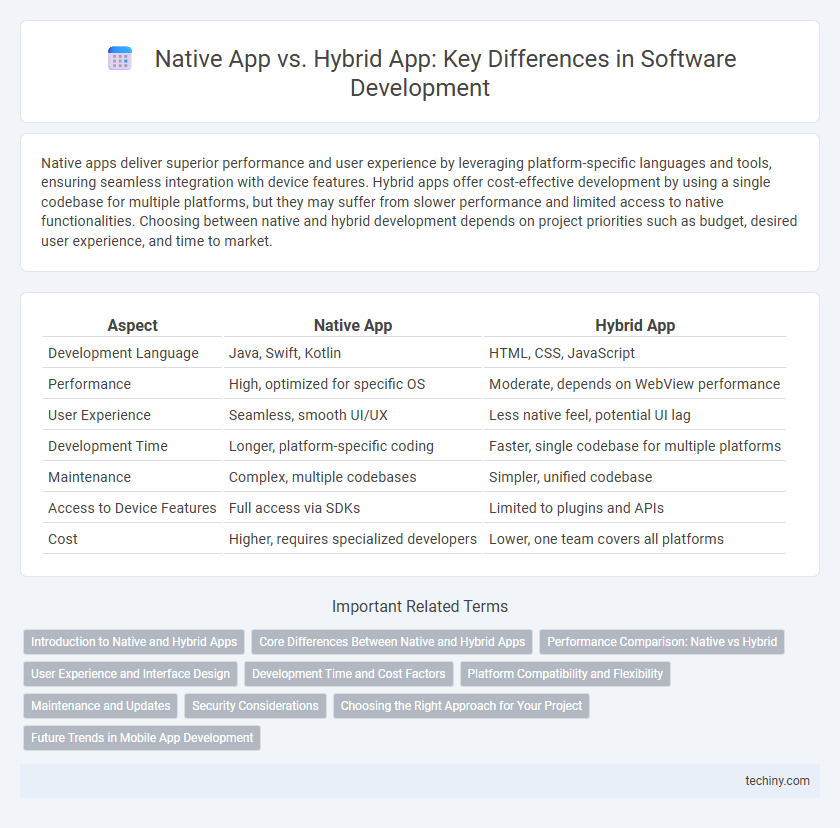Native apps deliver superior performance and user experience by leveraging platform-specific languages and tools, ensuring seamless integration with device features. Hybrid apps offer cost-effective development by using a single codebase for multiple platforms, but they may suffer from slower performance and limited access to native functionalities. Choosing between native and hybrid development depends on project priorities such as budget, desired user experience, and time to market.
Table of Comparison
| Aspect | Native App | Hybrid App |
|---|---|---|
| Development Language | Java, Swift, Kotlin | HTML, CSS, JavaScript |
| Performance | High, optimized for specific OS | Moderate, depends on WebView performance |
| User Experience | Seamless, smooth UI/UX | Less native feel, potential UI lag |
| Development Time | Longer, platform-specific coding | Faster, single codebase for multiple platforms |
| Maintenance | Complex, multiple codebases | Simpler, unified codebase |
| Access to Device Features | Full access via SDKs | Limited to plugins and APIs |
| Cost | Higher, requires specialized developers | Lower, one team covers all platforms |
Introduction to Native and Hybrid Apps
Native apps are developed specifically for a single platform using platform-specific programming languages such as Swift for iOS and Kotlin for Android, resulting in optimized performance and seamless user experience. Hybrid apps combine web technologies like HTML, CSS, and JavaScript within a native container, allowing cross-platform compatibility and faster development cycles. Native apps offer better access to device hardware and features, while hybrid apps provide a cost-effective solution for reaching multiple platforms simultaneously.
Core Differences Between Native and Hybrid Apps
Native apps are built specifically for a single platform using platform-specific programming languages like Swift for iOS and Kotlin for Android, resulting in optimized performance and access to device features. Hybrid apps leverage web technologies such as HTML, CSS, and JavaScript wrapped in a native container, allowing cross-platform compatibility but often with reduced performance and limited access to native device capabilities. The core difference lies in the trade-off between performance and development efficiency, where native apps offer superior speed and user experience, while hybrid apps provide faster deployment across multiple platforms.
Performance Comparison: Native vs Hybrid
Native apps deliver superior performance by utilizing platform-specific APIs and hardware acceleration, resulting in faster load times and smoother animations. Hybrid apps often experience lag and slower response due to the reliance on web technologies and an additional abstraction layer. Performance benchmarks indicate native applications achieve 30-40% better processing speed and lower battery consumption compared to hybrid counterparts.
User Experience and Interface Design
Native apps deliver superior user experience and interface design by leveraging platform-specific UI components and optimizations, resulting in smoother animations, faster load times, and more intuitive navigation. Hybrid apps, while more cost-effective and quicker to develop across multiple platforms, often face limitations in performance and consistency of UI elements due to reliance on web technologies and container frameworks. Prioritizing native development ensures seamless integration with hardware features and greater adherence to platform design guidelines, thereby enhancing overall user engagement and satisfaction.
Development Time and Cost Factors
Native app development typically requires more time and higher costs due to platform-specific coding for iOS and Android, demanding specialized developers for each environment. Hybrid apps use a single codebase built with web technologies like HTML, CSS, and JavaScript, reducing development time and overall expenses by enabling cross-platform deployment. The trade-off involves potential performance limitations and reduced access to device-specific features compared to fully native applications.
Platform Compatibility and Flexibility
Native apps are designed specifically for a single platform, such as iOS or Android, providing optimal performance and access to platform-specific features. Hybrid apps use a single codebase across multiple platforms, enhancing development efficiency and reducing time to market but may face limitations in accessing device capabilities. The choice between native and hybrid solutions depends on the required platform compatibility and the flexibility needed for user experience and feature integration.
Maintenance and Updates
Native apps offer streamlined maintenance and faster updates due to platform-specific coding, enabling direct access to device features and optimized performance. Hybrid apps, while enabling cross-platform compatibility, often require additional frameworks and plugins, complicating maintenance and delaying updates. Efficient update deployment in native apps reduces downtime and enhances user experience compared to the more complex update cycles in hybrid app environments.
Security Considerations
Native apps offer enhanced security due to direct access to device-specific APIs and built-in operating system protections, reducing vulnerabilities in data handling and storage. Hybrid apps rely on web-based components, which may expose them to greater risks such as cross-site scripting (XSS) and data interception through less secure web views. Implementing robust encryption, secure coding practices, and regular security assessments is crucial to mitigate threats in both native and hybrid mobile application development.
Choosing the Right Approach for Your Project
Choosing between native and hybrid app development depends on project requirements such as performance needs, budget constraints, and target audience. Native apps deliver superior speed, better access to device features, and enhanced user experience, making them ideal for complex, high-performance applications. Hybrid apps offer faster development cycles and cross-platform compatibility, providing cost-effective solutions for projects with tight timelines or limited resources.
Future Trends in Mobile App Development
Native apps continue to leverage platform-specific APIs and hardware capabilities, driving superior performance and user experience, essential for emerging technologies like AR/VR and AI integration. Hybrid apps evolve through frameworks like Flutter and React Native, enabling faster cross-platform development and streamlined updates, which cater to increasing demands for cost efficiency and rapid deployment. Future trends emphasize low-code/no-code platforms and AI-powered app development tools, accelerating innovation while balancing the trade-offs between native performance and hybrid flexibility.
Native App vs Hybrid App Infographic

 techiny.com
techiny.com